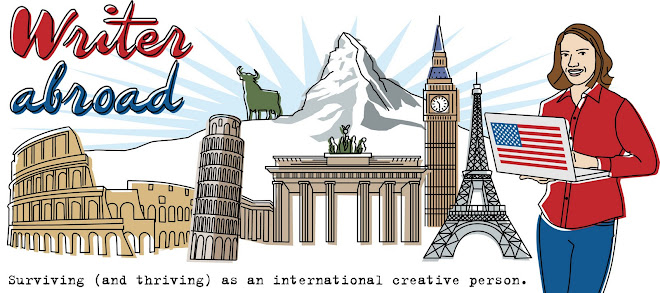
In the
previous post about the
financial realities of working as a writer abroad, you’ll see that depending on the cost of living in your country, it’s probably best to establish yourself in the local writing community in order to make a decent living wage for the place you live. (Unless you live in Panama, where those $6 blog posts might actually make you rich).
Work permits and other legal issues aside (that’s a topic for another day--make that days), how do you go from rags to riches? (Sorry, you don’t. You’re a writer.) But here are some things to consider in order to establish yourself:
1. Keep a blog and keep it updated. This sounds obvious, but after I started posting to my expat blog
One Big Yodel regularly for about two years (yes, it takes time--and you also have to promote it too), I gained a few of things: a voice, a loyal readership, and a few writing offers. A couple weeks ago, before I was about to be interviewed on a Swiss radio station, the director of the station told me, “Be as sarcastic as possible.” I laughed, but in a way, it was a compliment. It meant I had established a voice and people were starting to recognize it.
2. Learn the language. I’m still working on this one (three-week intensive German, here I come), but when you learn the language of your country you learn things about the people, the culture, and the surroundings that visitors and tourists just won’t. You’ll have insights that are fresh, honest, and unique. And most importantly, you’ll be able to make friends with the locals. I just pitched a Swiss magazine and got assigned a feature story about a fight for women’s rights that I never would have known about if it hadn’t been for a Swiss friend of mine.
3. Write for free. Ok, this sucks. But it worked for me so that’s why I’m mentioning it. If your country is anything like Switzerland, there’s probably some kind of expat magazine or newsletter that gets distributed a few times a year and needs writers like you. When I first arrived, I wrote for Hello Zurich (now
Hello Switzerland) a couple of times. Then, when I interviewed to write for a paying magazine, the editor already knew my style and I was able to establish my own column.
4. Make business cards. Lawyers have them and they feel important. You can too. Plus it just makes you look serious about what you do. There are so many wannabe expat writers out there and you need to separate yourself from them. A website will help you do this too.
5. Network. (Hint: the more alcohol you drink, the better your foreign language skills will get.) But forget about that. Social networking makes it easier than ever for introverts like us to make ourselves known. If you want to write for a well-known blog, leave comments on the posts. To get your name out there, network with other bloggers and write guest posts that link back to your blog. If you admire a certain writer that’s already established in your country or city, email them and ask to meet for a coffee.
But enough about what I think. What have you done to establish yourself either as a writer abroad or a writer at home?








